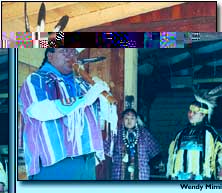|
Jan. 24, 2001
By Jim Mimiaga Ute song and dance will be featured at the opening ceremonies of the 2002 Winter Olympics in Salt Lake City on Feb. 8. Thirty Ute Mountain Utes, including tribal chair Judy Knight-Frank, will participate in an elaborate ceremony honoring six native tribes of the West. Two other Ute bands ó the northern Utes and the Goshutes ó will be represented, along with the Navajo, Paiute and Shoshone tribes. "Iíll be wearing native costume and dancing in formation like everyone else," said Knight-Frank Tuesday. "Itís a once-in-a-lifetime opportunity that we are very proud to participate in." Hundreds of millions of people are expected to tune in to the opening ceremonies, 15 minutes of which will be a Hollywood-directed program recognizing Native American culture. The three-part music score, which has been pre-recorded for broadcast during the ceremony, combines contemporary Native American songs with more traditional pow-wow music. "It will be spectacular," said Aldean Ketchum, who performed the flute music on the tracks and will pantomime the tunes during the lively ceremony. "It is all very coordinated and there will be lots of pyrotechnics so each time there is a drum beat, flames shoot out of various platforms." Ketchum, a Ute from White Mesa, Utah, will perform his traditional flute music on an elevated platform during the program. Ketchum is well-known throughout the Southwest for his skills in building and playing native flutes. "The flute has a long history in Ute culture that has been passed down through the ages," he said. "On the cliff walls and in caves, there are images of flutes played by the Anasazi, which we are descended from." Already the performing group from Towaoc and White Mesa has attended a practice session at the site of the ceremony, Rice-Eccles Stadium on the University of Utah campus. Extensive background checks were conducted for all ceremony participants, ruling out anyone with a criminal record. Needless to say, security at the Games will be very tight, said coordinator Bob Frank. "We were informed to contact security if someone tries to join our group we donít know, or if we see anything suspicious," he said. "There are several checkpoints and holding areas before we enter the stadium and afterwards we have to leave the city immediately." The Southern Ute tribe has backed out of its participation in the Olympics, citing fears of a terrorist attack, according to reports in the Los Angeles Times and Durango Herald. The ceremony itself is coordinated on the stadium ice used by athletes. A boardwalk is formed to represent a giant dream-catcher, a symbol of the mythical spirit world that is part of American Indian beliefs. The Ute tribes will enter the stadium first, in a show of respect for indigenous culture. Decked out in traditional costume and wearing red, they will be performing tribal dances while moving in a coordinated "necklace" formation. "We will be letting the world know that our culture still exists today, that we are still here and are thriving," Ketchum said. Today, Utah society is dominated by followers of the Mormon religion. But historically all of the mountains and valleys of Utah were home to the wide-reaching Ute tribe before pioneers came. Reminding the world of the true "First Americans" is a big focus of the ceremony. "Having Indian peoples enter first shows that Utah is not just Mormons, that Native Americans were here first and still are," Frank said. "It is a gathering of nations." "We only live once, and we want our 15 minutes of fame," laughed Jerald Peabody, a singer in the program. He and other Indian singers will form the five rings of the Olympic symbol. Pow-wow songs, drumming, and Ute dance styles ó the Northern, Southern Straight and Grass dances ó will be performed and gifts will be exchanged between tribal spiritual leaders. Forty-two cameras set up around the stadium will document the event for television. "We will do our best as dignitaries for the tribe," said Lisa Manning of the Manning Family native dance group. Towaoc and White Mesa participants will be in Salt Lake for eight days ending on Feb. 8. They will have two days off to experience the Winter Games.
|
||
|
Copyright © 2001 the Cortez
Journal. All rights reserved. |
